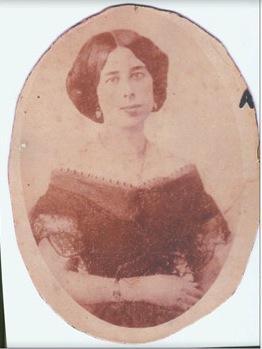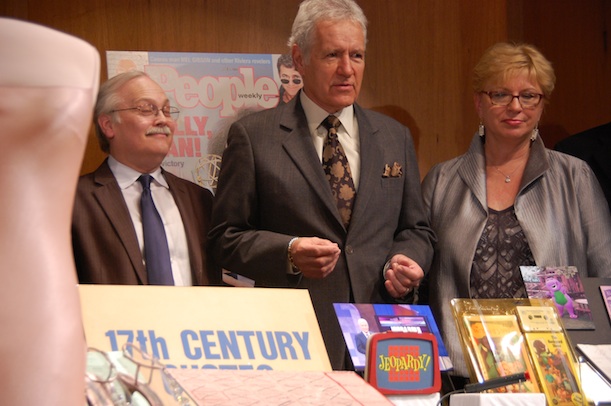Alex Trebek on Why ‘Jeopardy’ Represents the American Dream
The game show host, who died Sunday at age 80, donated items to the Smithsonian in 2013
:focal(1285x542:1286x543)/https://tf-cmsv2-smithsonianmag-media.s3.amazonaws.com/filer/25/9b/259ba62e-9cdf-474b-87db-f49fcc6aafa9/gettyimages-98521850.jpg)
Editor's Note, November 9, 2020: Longtime “Jeopardy” host Alex Trebek died on Sunday, November 8, after a yearlong battle with pancreatic cancer. The 80-year-old left an indelible mark on the world of daytime television, exemplifying the “quintessential quizmaster [and] bringing an air of bookish politesse to the garish coliseum of game shows,” writes Emily Langer for the Washington Post.
In 2013, Smithsonian magazine spoke with Trebek to learn more about the television staple's enduring popularity. Read the conversation, recirculated to mark Trebek's passing, below.
Alex Trebek has often called game shows “the best kind of reality television” for the way they encapsulate the American dream. On “Jeopardy,” he says, anyone can earn success with enough wit and skill. Now, a donation from Trebek to the National Museum of American History of several items from his popular game show cements that idea in popular culture. In a new partnership with the National Academy of Television Arts and Sciences, the museum accepted a cache of items representing three categories of the Daytime Entertainment Emmy Awards: daytime dramas, game shows and children’s programming.
Trebek, who was recognized with a Lifetime Achievement Daytime Emmy Award in 2011, as well as five Daytime Emmy awards, contributed a script with handwritten notes from one of his 1984 shows. Also making donations were 1999 Daytime Emmy Award-winner Susan Lucci, better known as Erica Kane from the popular soap opera “All My Children,” and 2001 honorees Kathy and Phil Parker, who created the 1990s children’s television program “Barney & the Backyard Gang.” Lucci’s pink gown and shoes from her cover of People magazine played colorful companion to the plush purple dinosaur donated along with the script from the first “Barney” video.
“Game shows have been an important part of daytime television since the 1940s,” says curator Dwight Blocker Bowers, “when the radio series, ‘Truth or Consequences,’ made its debut as a television show.” The show selected ordinary citizens as contestants to answer trivia questions and to perform zany stunts. Over time, he says, the questions got tougher and the prizes, bigger.

Trebek, a naturalized U.S. citizen born in Canada, says his show gives people “opportunity.”

“All My Children’s” Lucci, who was a one-time contestant on one of the “Jeopardy!” celebrity episodes, says she was worried about the challenging questions that might come her way. But, it wasn’t the questions that stumped her. “Once I got one of those buzzers in my hand and was on camera,” she says, “I realized that I had no buzzer technique at all.”

Lucci signs over the deed for the dress and shoes she wore on the cover of People magazine after her Emmy win.

From left to right: Bowers, Trebek and Parker stand in front of the table of donated items, which include Lucci’s dress, her pair of Manolo Blahnik heels, a ‘Jeopardy’ script with Trebek’s notes and a buzzer from the show, along with items from the “Barney” show.
We talked with Trebek at the donation ceremony:
Why has the show enjoyed so much success since its debut in 1964?
It’s a quality program and it appeals to the aspects of American life that are very important to us: opportunity, we give everyone an opportunity to compete even if you’re an ordinary citizen. It doesn’t matter what your background is, you can compete on our program and do well if you have knowledge. You can fulfill one of the American dreams, which is to make a lot of money. You’re not going to be elected president just because you appear on ‘Jeopardy.’ Although we’ve had ‘Jeopardy’ winners in the past who have done very well in the public arena. One of them is the current director of our consumer affairs department, nominated by President Obama. He was a ‘Jeopardy’ winner and in fact, when he first ran for Congress in Ohio, his bumper sticker said, ‘The answer is.’
We are now part of Americana so we’re accepted, people know us, they like us, we’re familiar, we’re part of the family.
If you were a contestant what would your biographical detail be?
I’m willing to try everything once. I’m just thinking back to sky-diving, scuba-diving, running military equipment, flying in a F-16 and taking 8Gs, parachuting, it doesn’t matter. I’m a little too old now to get out and do that stuff but there are a few things on my bucket list.
You’ve been hosting since 1984. Are we getting smart or dumber?
There are bright people in all walks in life and probably in the same percentage as there have always been. We’re attracting more of them so people think America is getting smarter, I don’t know about that.
But not dumber?
Some people are.
/https://tf-cmsv2-smithsonianmag-media.s3.amazonaws.com/accounts/headshot/Leah-Binkovitz-240.jpg)
/https://tf-cmsv2-smithsonianmag-media.s3.amazonaws.com/accounts/headshot/Leah-Binkovitz-240.jpg)